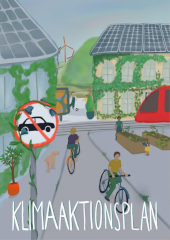
The Swiss Climate Strike just presented their Climate Action Plan. It includes 138 measures to effectively tackle climate change. With them, it presents pathways for Switzerland to move towards zero net carbon emissions by 2030.
It includes bold measures to curtail aviation in a socially acceptable way. Notably, they advocate for a frequent flyer levy. This form of taxation is progressive relative to the amount of flying by an individual in a four-year period.
Banning private jets is also part of the plan. The proposed ban includes other forms of luxury aviation. People should not be allowed for instance to fly up a mountain for skiing or down-hill biking. See below the details.
Another goal of the plan is to provide incentives for synthetic fuel from renewable energy. It foresees synthetic fuels quotas, and emissions caps and taxation on fossil fuel use.
Obviously, the plan also asks to stop any subsidy or tax break for aviation, to ban short flights and to consider other climate change effects of aviation besides CO₂.
The Climate Strike movement grew out of the Fridays for Future demonstrations in Switzerland. They drafted the Climate Action Plan together with scientists and external advisors. BanPrivateJets.org contributed to the parts on aviation.
The details
The entire Climate Action Plan is available in English. The parts on aviation start at pages 12 and 95.
You can also surf the plan at Climate Strike’s website, in German, French or Italian (details always in English).
As an example, you have below the subsection on private jets.
Policy 2.24: Ban Private Jets and other Forms
of Luxury Aviation
Description
Most private jets are smaller than regular passenger planes and, while they each use less fuel, they are less efficient in terms of emissions per transport capacity. Some very rich people even use normal-sized jets with hotel-like furniture for private transportation. Private Jets mostly fly below their passenger capacity and often even empty (Harvey 2019). An average private jet journey within Europe emits 10 times as much greenhouse gases as the same journey made by an economy class flight, and roughly 150 times more than an equivalent high speed train journey (Beevo and Murray, n.d.).
Unlike many other things, no one really needs private jets, in fact only a tiny fraction of the global elite gets to use them. Therefore, we demand an immediate ban on private jets and expect their current users to switch to airline flights. The goal is to also ask the richest elite to take steps to combat the climate crisis and lower their contribution to it and therefore making the other measures more socially acceptable (Leandros 2019). A few exceptions may be made for non-commercial general aviation services in the public interest.
A similar logic applies to flights with helicopters or propeller machines for personal transportation or recreation. This includes taxi-flights, heli-skiing or flights to move mountain bikes uphill. We consider these flights luxury aviation because they provide services nobody really needs or can easily be substituted by less polluting alternatives. As such they should also be banned. Moreover, beyond climate change considerations, all these flights also produce noise and smog.
Impact
The emissions of CO2eq directly saved by this measure might seem marginal, however, put in relation to the low number of people affected, they are very high. Most importantly, enacting this measure would give legitimacy to climate policies that affect larger numbers of people. The indirect impact by virtue of its political messaging is big.
Social Compatibility
Since only very few are impacted, and only the richest elite, the policy should be very socially acceptable. It also sends a signal that everyone has to adjust, and even more so those with the largest emissions footprint. It is thus compatible with the idea of climate justice and makes the other policies even more socially acceptable.







